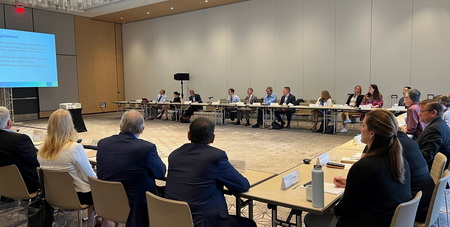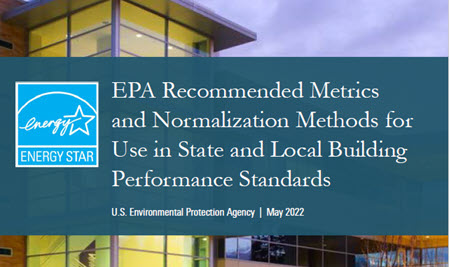
The Real Estate Roundtable and industry partners encouraged the U.S. Environmental Protection Agency (EPA) on Sept. 14 to enhance its set of effective, standardized, and voluntary federal tools that can assist real estate companies meet climate targets imposed by city and state laws. (Real estate coalition letter, Sept. 14)
EPA Standards to Quantify Emissions
- The coalition endorsed EPA’s planned improvements to its free, online Portfolio Manager benchmarking tool, announced in an ENERGY STAR July 2023 policy brief. Nearly 25% of U.S. CRE space measures energy and water use, waste disposal, and GHG emissions using Portfolio Manager.
- The coalition’s letter cites the ENERGY STAR Commercial Buildings program as an exemplary “public-private partnership to address the climate crisis and enhance our nation’s energy independence.”
- Portfolio Manager and other EPA resources can help real estate owners, developers, and lenders with common tools to comply with numerous building performance standards (“BPS”) enacted at the state and local level, and similar non-governmental frameworks like the one proposed by the Science Based Targets Initiative (“SBTi”). (Roundtable Weekly, July 14 and Jan. 20).
- Without EPA’s voluntary resources to support uniform emissions measurement, compliance with local mandates is “exceedingly difficult, impracticable, and in some cases, impossible,” the letter states.
- “We value greatly our longstanding collaboration with the US-EPA’s ENERGY STAR program. It is the gold standard of resources which help our industry report on energy efficiency and the financial impacts from the increase of renewable energy supplies,” said Roundtable Sustainability Policy Advisory Committee Chair, Tony Malkin (Chairman, President, and CEO, Empire State Realty Trust), below.

- Malkin added, “Non-binding federal guidelines from the EPA’s strong and best-in-class analytical frameworks are the North Star through which local governments can inform their law-making, and this helps to bring some sense and order to the otherwise conflicting patchwork of climate laws and frameworks developed by states, cities, and NGOs. The future is hard facts and data, and our industry is fortunate to have a constructive and productive relationship with the EPA that focuses on points on the board, the how to address the what.”
- The American Hotel & Lodging Association; Building Owners and Managers Association (BOMA) International; CRE Finance Council; ICSC; Mortgage Bankers Association; NAIOP, Commercial Real Estate Development Association; and Nareit® joined The Roundtable on the coalition letter.
Anticipated SEC Climate Rules

- The Roundtable’s call for uniform methods to calculate and report emissions anticipates overdue rules this fall from the U.S. Securities and Exchange Commission (SEC). The SEC’s rules are expected to compel registered companies to disclose in investor filings material financial impacts related to climate change. (See Roundtable Weekly, June 10, 2022 and RER comments).
- SEC Chair Gary Gensler testified this week before the Senate Banking Committee that rules regarding disclosure of Scope 3 “indirect” emissions could be changed. “Really important issues have been raised around Scope 3,” he said. (Wall Street Journal, Sept. 12) (See also Roundtable Weekly, March 17).
- Gensler is also scheduled to testify before the House Financial Services Committee on Sept. 19.
- A Sept. 12 podcast featuring Roundtable Senior Vice President & Counsel Duane Desiderio, and Nareit’s Senior Vice President of Environmental Stewardship and Sustainability Jessica Long, discusses the imminent SEC rule and other real estate policy priorities in the energy and climate arena. (Listen to Nareit’s “Real Estate Roundtable says CRE Playing Key Role in Success of Federal Climate Programs”)
The Biden administration’s emphasis on climate policy will continue this fall, when it is expected to propose a uniform federal definition on the long-term concept of “zero emissions buildings.” The Roundtable’s SPAC will convene a working group to analyze the definition upon its release for public comments.
# # #








 The Real Estate Roundtable on Dec. 5
The Real Estate Roundtable on Dec. 5 







